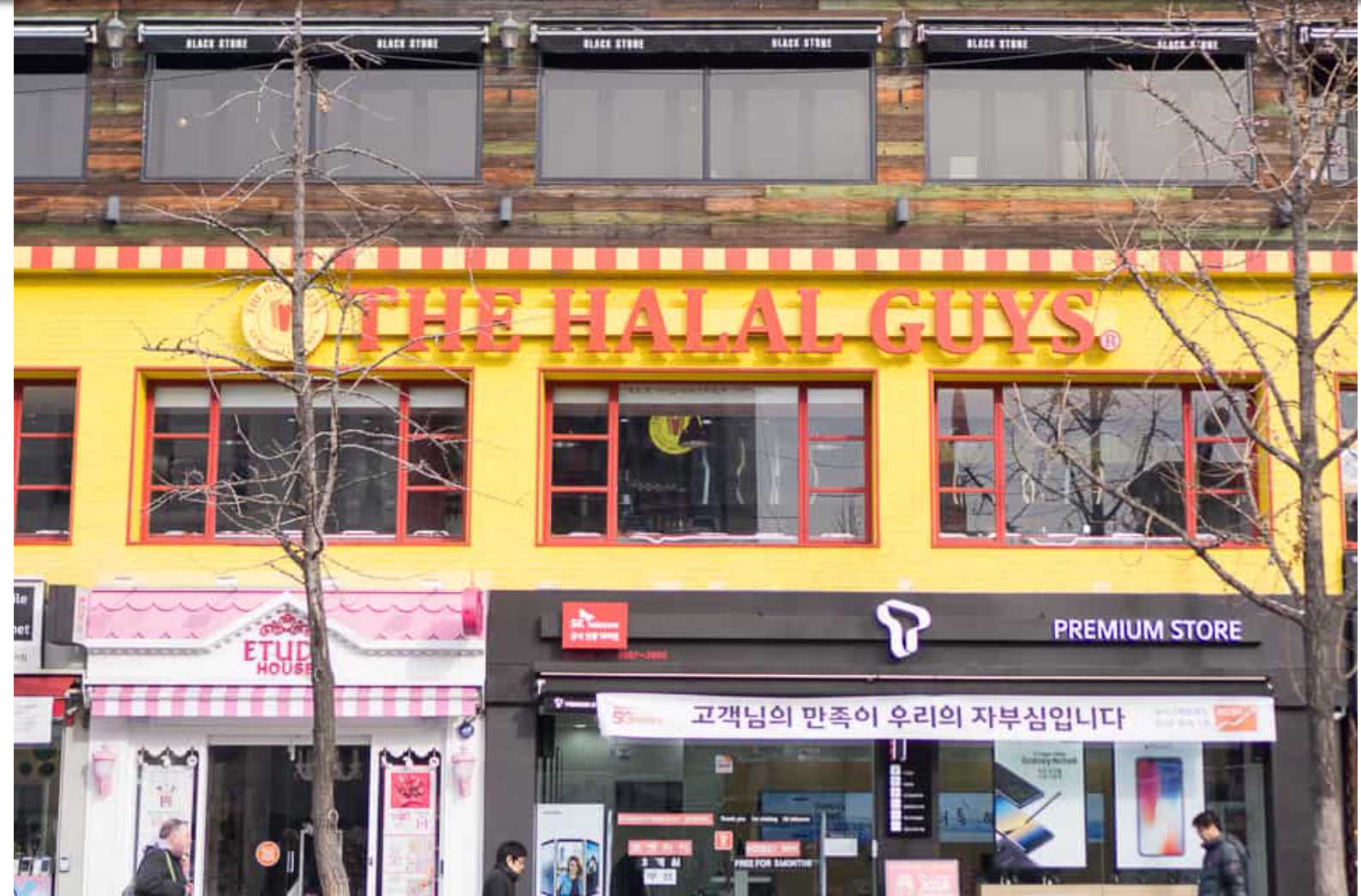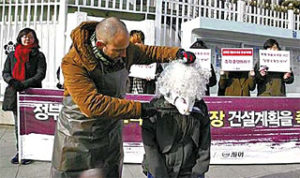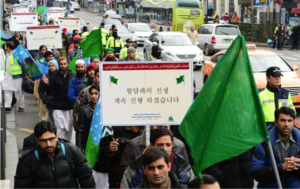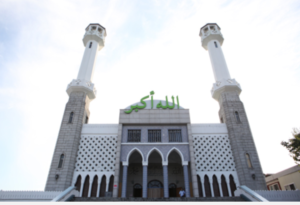
Growing Islamic Consumerism on a Global Scale and South Korea’s Interest in the Halal Industry
Due to an increase in the Muslim population and the emergence of value-oriented consumerism especially among educated, affluent Muslim youth, global markets haveobserved a growth in Islamic consumerism since the 2000s. These new consumer segments tend to express their religiosity through consumption patterns and thereby, display religious and cultural identities in public. Today, Islamic consumerism suggests that there is compatibility between religious dogma and modern consumerism in various fields, including food, cosmetics, finance, media, and leisure. With the emergence of Muslim consumers as a new powerful segment, shaping a new niche market, multinational companies have begun to sell products and services that reflect the taste of Muslim consumers.
South Korea is not exempt from these trends. Since March 2015, when the previous president Park Geun-hye signed a memorandum of understanding (MoU) with the United Arab Emirates (UAE) government for cooperation in the new emerging halal market, South Korean companies began to participate in the new Islamic markets. However, the more the government supported policies related to halal industry in South Korea, the more severe the anti-Islamic responses it has received from the public. The anti-Islamic or Islamophobic sentiment (a general umbrella term that indicates acts or feelings against Muslims based on fear, dislike, and discrimination, Eum, 2017: 831) among South Koreans is multilayered. South Korea’s ethno-nationalism is articulated through a reproduced Orientalism. It is also a site where, according to some, a clash of civilizations is observed between Christianity and Islam. Others contend, halal industry has become a site where the political interests of various groups collided and allied to achieve public consensus and power.
South Korea’s Economic and Political History of Engagement in the Halal Industry
South Korea’s economic policies on halal industry was initiated by the government in 2015. The Ministry of Agriculture, Food, and Rural Affairs (MAFRA) established the Halal Division (now defunct) in March 2015 in order to develop an MoU with the UAE government. The main aim of the Halal Division was to promote a local halal policy and export South Korean halal certified food to Islamic countries. To achieve its goal, the government allocated KRW 9.5 billion (equivalent to $ 8.4 million) to establish a slaughterhouse to process halal meat, developed a South Korean halal standard, funded South Korean food companies that manufacture and export within the Islamic market, and conducted R&D targeting the global halal markets. In addition to South Korea’s new policy to seek new global consumers, South Korea has observed a considerable increase of inbound Muslim tourists due to the South Korean Wave, or Hallyu,as well as Muslim students and patients from the Middle East. The number of Muslim tourists reached almost 1 million in 2016, and South Korea has seen it as an opportunity to diversify its markets that had heavily relied on China and the U.S.
On the political front, the THAAD (Terminal High Altitude Area Defense) crisis enhanced the need to diversify South Korea’s markets beyond China. As soon as the South Korean government decided to deploy the THAAD system as a defense against North Korea’s military provocations in 2016, China responded with covert retaliatory policies, such as strengthening its trade barriers and boycotting South Korea’s Hallyu related products. Relations between South Korea and China further deteriorated in August 2017, with the placement of the THAAD in Sungju, the southern part of South Korea.
With deteriorating relations with China and its impact on economic relations, the South Korean press urged a paradigm shift from the Chinese market to the Muslim market as a new export destination for South Korean products, using the rhetoric of the Muslim market as an “alternative post-Chinese market” or “Islamic Hallyu.”To allure more Muslim tourists, the Ministry of Culture, Sports, and Tourism announced the reallocation of a publicity budget originally aimed for Chinese tourists to Muslim and Japanese tourists. Local governments, such as Gyeongsang province and Jeju Island, also set up policies to foster a Muslim-friendly tourism environment, including support for halal restaurants and erecting prayer rooms at various tourist sites (Eum, 2018).
However, the government-initiated halal policy was withdrawn due to the impeachment of President Park in December 2016 and her dismissal from the office in March 2017 on charges of abuse of power and corruption. Under president Moon Jae-in’s leadership from May 2017 onward, South Korea’s Islamic halal market strategy has almost disappeared. The only references to it are included in the “New Southern Policy” that was initiated on 9 November 2017, mainly targeting South East Asian consumers. It is also noticeable that unlike the previous government which stipulated an overt halal strategy from the governmental level, the Moon administration does not use the words “Islam” or “halal” in an effort to avoid being seen as mimicking the previous government’s policy and to avoid the challenges raised from national Islamophobic sentiment that surfaced during the application of the halal policy.
South Korea’s Public Reaction against the Halal Policy: Collective Negativism and the Anti-Halal movement
Overtly expressed public Islamophobic sentiments became commonplace in South Korea after the introduction of the government’s halal policy in 2015. Among South Koreans, Islamophobia and its association with the threat of terror were of little concern before September 11. Prior to that period, issues around Islam was not closely watched by many South Koreans, but those issues were quickly transformed into a real threat “in here” after 2015. The immediate context for this was the emergence of ISIL and global terror attacks.
South Koreans became more concerned with Islam when a young South Korean man known as Kim joined ISIL in 2015. The phenomenon was aggravated by consecutive terror attacks in the West and in Asian countries. There was a growing fear of a Muslim influx due to the global Hallyu phenomenon and the government-initiated halal policy. The tension derived from this wave of Islamophobia further increased when the government announced the construction of a Halal Zone within the National Food Cluster in the Iksan area, North Jeolla Province in 2015. The Iksan provincial government faced consecutive anti-Islam demonstrations from villagers, extreme Christian groups, and NGOs such as animal rights activists. The participants argued that profits from the halal industry would support Muslim terrorist groups and that the government should not support any specific religion and retain its neutral position. Iksan province’s halal cluster project triggered tension between the government, which advocated for a Muslim-friendly policy, and those who reject the halal policy mainly because of Islamophobic sentiments. In addition, fears raised from unsubstantiated rumors about the government’s halal policy contributed to this wave. These claims included statements such as: “…the government leased land (500,000 square meters) in Iksan for free for 50 years. Halal slaughterhouses will be built in the complex, and Imams and Muslim slaughterers will enter Korea… and they should be blocked” (Cho, 21 January 2016). In 2016, the central government postponed indefinitely (and eventually canceled) the Halal Zone establishment project within the National Food Cluster due to consecutive anti-Islam demonstrations.
Some South Korean halal companies perceived the Iksan case as a negative precedent that would have a potentially negative impact on South Korea’s relations with Islamic countries. They also believed it created uncertainty around government projects because of the opinions and actions of interest groups. Starting with the Iksan case, various government halal projects have been canceled due to relentless campaigns that consistently produced and spread anti-halal rumors. For example, the Gangwon regional government canceled hosting the 2017 World Islamic Economic Forum in Pyeongchang prior to the Winter Olympics in 2018. This was followed by the cancellation of the Busan regional government’s Muslim cruise travel project, Daegu city’s halal business project in 2016, and Buyeo city’s plan to build a halal slaughterhouse in August 2017. Today, Islamophobic sentiment among South Koreans shows signs of a steady increase online, and this climaxed with the Yemeni refugee crisis during the summer of 2018. Around 550 Yemeni refugees fled from Malaysia to the popular tourist island of Jeju, taking advantage of the visa waiver program between Malaysia and Jeju Island. For them, South Korea was considered a safe place as a signatory to the UN Refugee Convention. However, several petitions were registered on the Blue House’s online bulletin, asking the government not to offer them refugee status. The Yemeni related petition was recorded as one of the hottest issues on the Blue House bulletin. At the same time, South Korea’s public opinion was split between opponents of refugees and refugee advocates. The case with Yemeni refugees were not approached with reference to the context of refugees seeking asylum but rather from a religious and security context, and it was interpreted as an Islamic religious invasion. Therefore, hosting them was regarded as threatening internal security. This consequently aggravated anti-Islamic sentiment within South Korea that had bec0me associated with the anti-halal movement.
An Analysis of the Islamophobic Views in the South Korean Context
The examples provided above point out that negative images of Islam prevail in South Korea. The recent popularity of Islamophobic views in South Korea can be explained using the following three spectrums: first, South Korea shared a reproduced Orientalism with the West, demarcating lines of “us” against “them”; second, South Korea’s Islamophobia is also expressed as a form of a clash of civilizations within which Christianity collided with Islam; and finally, anti-Islam views are used by different interest groups to gain power and garner public support. These spectrums are interwoven together in constructing Islamophobia among South Koreans, and below, I examine them individually in detail.

First, South Korea’s Islamophobia is characterized as a form of “reproduced Orientalism.” According to research related to Islam’s image within South Korea,Islam is mostly associated with the negative image of religious fanaticism, brutality, and violence. South Koreans also consider Muslims as regressive, war- and terror-ridden, and sexist – the gender oppression element is represented by the veil worn by Muslim women. At the same time, these studies stress that South Koreans’ opinions of Islam share the negative aspects of Western views of Islam. This is due to a lack of concern over issues around Islam, lack of direct contact with Muslims, and heavy reliance on Western media(Cho, 2004; Jamass, 2014; Jeon, 2011; Kim, 2013; Lee, 2011; Lee, 2011, quoted from Eum, 2017). Lee explores how South Koreans “reproduced” Orientalism, which influences the way of looking at and dealing with people from the so-called third world (Lee, 2003, requoted from Eum, 2017). By making them the “other,” South Korean culture positions itself in the same way as the West: the superior “us” versus the inferior “them.” This is mainly because South Korea internalized the negative Western views of Islam through the lens of evangelical missionary schools established by American missionaries during the modernization period (Lee, Hee-Soo, quoted from Lee, 2018). In addition, South Korea’s mystified ethno-nationalism based on “one” blood, language, and tradition also enhanced South Korea’s reluctant attitude of accepting “otherness” and cultural diversity. IPSOS, a global market research and consulting firm, conducted a survey related to “The Inclusiveness of Nationalities” and the result demonstrated thatSouth Korea ranked 24thamong the 25 countries under examination in terms of accepting Muslims (Cha, 30 June 2018). In South Korea’s cultural context, which upholds a strong, unified identity, the halal could be perceived as unfamiliar, “new,” and a threat, and therefore, unacceptable.
Second, in reference to the framework of the infamous clash of civilizations theory, Islamophobia within South Korea could be considered as the site of conflict between Christianity and Islam. Christians make up 27.6 percent of the total South Korean population (19.7 percent or 9.6 million are Protestant and 7.9 percent or 3.9 million are Catholic), Buddhists make up 15.5 percent (7.6million people) of the population (Statistics Korea, 2015), whereas Muslims are a minority, supposedly composed of only 200,000 people (Park, 2015). Fromthe Christian perspective, the influx of Muslims and the development of the government’s halal industry was regarded as a threat. Therefore, sometimes the anti-Islamic rhetoric is used, including “Islamic tsunami is rushing (toward us)” or “Islam is waiting for a chance (to sneak into Korea).” Lee and Park argue that the conservative and radical Protestant churches are responsible for propagating the negative image of Islam and fostering fear and hostility toward Islam (Lee, 2011 & Park, 2017). According to Lee, Islam is demonized by the churches and anti-Muslim rumors are spread by preachers, sermons, books, research, and newsletters, and these circles acted as the main opposition force against South Korea’s halal policy.
Lastly, Islam is politicized by those forces outside of the religious landscape too. Islam is used by some political and interest groups to gain power by acquiring public consensus. The Christian Liberal Party carried out an election campaign for the 2016 National Assembly, based on an anti-Islam platform and labeling Muslims as terrorists and sexists. Even though this effort did not produce the return they had hoped for, it demonstrated the first case of a political party using Islamophobia and anti-halal rhetoric in formal and public politics. Islamophobia even climaxed with the issue of Yemeni refugees in the summer of 2018, as mentioned above. During this anti-refugee protest, interestingly, the anti-Islamic rhetoric touched upon gender issues. Some feminist groups joined forces with with Christians church groups and conservative nationalists and protested and demonstrated in Gwanghwamoon square (known as a peaceful candle demonstration site during the President Park’s impeachment) to force the government not to accept Yemeni refugees. Highlighting that most of the refugees were men (504 of 549 refugees were men, making up of 91 percent of the group; women’s numbers stood at 45 and 18 were juveniles), they used the rhetoric of “protect our women” or “a safe place for our women” against the Muslim male refugees. This stimulated tensions among young South Korean women. According to a poll concerning South Koreans’ views about Yemeni refugees conducted by the JoongAng Daily Newspaper, South Korean women in their 20s and 30s demonstrated the most hostility and fear against Yemeni refugees: 50.4 percent of female respondents said they were “hostile” toward refugees, 11.5 percentage points more than that of men (38.9 percent). By age, the 19-29 age cohort had the highest level of hostility (58.0 percent), followed by people in their 30s at 54.4 percent, and this was more than 10 points higher than people in their 40s (37.0 percent), 50s (37.3 percent), and 60s (40.9 percent) (Cha, 30 June 2018). Kim criticized the “Femonationalism phenomenon of Islamophobia (a term coined by Sarah Farris, and requoted from Kim, 2018)” in which feminist themes such as women’s rights and violence are used in anti-Islamic campaigns and anti-immigrant campaigns. She argues it presents a “dangerous alliance” between feminist, nationalist, and Christian groups.
Consequently, the negative discourse in 2018 caused by the Yemeni refugee issues and Islamophobic sentiments struck the halal industry within South Korea. Some radical online websites and bloggers shared a list of South Korean companies that manufacture halal food and boycotted the product lines of those companies, and spread unfound rumors such as the companies’ support for Muslim terrorist groups (Cho, 24 July 2018). Subsequently, companies that joined the halal industry, expecting profits from the growing halal economy, were instead directly impacted by the Islamophobic tendencies that prevailed among South Koreans.
A Way out of Islamophobia in South Korea and the Future of the Halal Industry
Currently, Islamophobic sentiments in South Korea mostly forms around unfounded rumors and “fake news” and has become a major obstacle for South Korean companies seeking to enter the new Islamic market. While Islamophobic views are widely spread among ordinary South Koreans, the South Korean central and regional government views the Islamic market as necessary to advance the diversification of South Korea’s exporting market. Therefore, the South Korean government is attempting to form a counter-discourse against Islamophobic messages targeting the halal industry, shifting the public attention from religious paradigm to one of food safety issues by addressing the hygiene, cleanliness, and ethical ecosystems of halal regulations.
In order to alleviate the negative image of Islam in South Korea, the central and regional governments have promoted cultural events, such as the annual Arab cultural festival, the Arab film festival and halal restaurant week Korea, funded by the Ministry of Foreign Affairs and the South Korea Tourism Organization. Other initiatives include the expansion of educational programs, lectures, and exhibitions for the public. The press also plays a significant role in building a positive perception of Islam by discussing images of the Islamic world that are not terror-related. Not only is South Korea trying to eradicate prejudice against Islam among their citizens, but Islamic countries are also arranging events to help change the negative image of Islam in South Korea. For instance, celebrating the 55th anniversary of the establishment of diplomatic relations between Saudi Arabia and South Korea in October 2017, Saudi Arabia organized a “One day Saudi trip” in a park near the Han River that any passer-by could access. The event presented Saudi food and coffee, as well as henna drawing and calligraphy. The Omani Embassy also organized a traditional clothing fashion show in May 2018, collaborating with South Korean designers. While it is too early to develop a full assessment of the impact of these initiatives, and South Korean engagement with the Islamic market, there are signs that these efforts may bear fruit and South Koreans may overcome recent waves of Islamophobic sentiments.
*This essay is partially based on and expands the arguments developed in the author’s two previous publications cited below.
References
Cha, Se-hyon (30 June 2018), “Koreans, the inclusion index is 18th out of 25 countries”, Joongang Sunday, https://news.joins.com/article/22760909
Cho, Aran (24 July 2018), “Halal Firms Fighting Refugees’ fear”, Hankuung Newspaper, http://news.hankyung.com/article/2018072447701
Cho, Chung-un (21 January 2016), “Ministry denies rumored inflow of Muslim workers for halal food”, http://www.koreaherald.com/view.php?ud=20160121001052
Eum, Ikran (2017), “Korea’s Response to Islam and Islamophobia: Focusing on veiled Muslim women’s Experiences”, Korea Observer, 48-4, 825-849.
________(2018), “The Current State of Muslim-Friendly Tourism Policies in Non-Islamic Countries: an Exploratory Study of Korea’s Approach”, International Journal of Islamic Marketing and Branding, 3-1, pp.65–81.
Kim, Nami (28 June 2018), “Dangerous solidarity’ in the name of ‘women’s human rights’: petition for the acceptance of Yemen refugees and Islamophobia”, Webzine 3.0, https://minjungtheology.tistory.com/992
Lee, Jin-gu (2011), “The Protestant Church’s Image of Islam in Multicultural Korea: A Focus on Islamophobia,” Journal of the Association for Critical Studies of Religion and Culture, Vol. 19, 163–192.
Lee, Nuri (8 June 2018), “Living in Korea as a Muslim” Seoul National University Journal, http://www.snujn.com/news/38604
Park, Jong-soo (2017), “Islamophobia of the phenomenon and Issues in Korean Society: Focusing an Intercultural Perspective”, Journal of Religion and Culture, Vol. 29, 49-70
Park Kwan-kyu (24 Jan 2015), “Uncomfortable gaze, uneasy coexistence … 20 million Muslims in Korea”, The Hankookilbo Newspaper, http://www.hankookilbo.com/News/Read/201501240466748419
Statistics Korea (2015), Population and Housing Census of 2015, Statistics Korea

